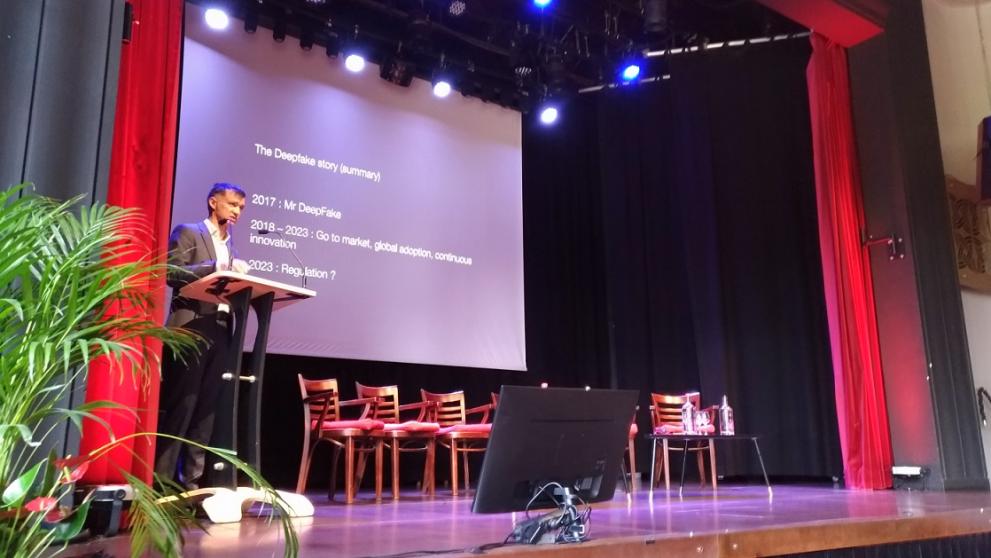
Disinformation, fake news and hate speech are increasingly used to manipulate the public opinion by infusing uncertainty and fear with the help of modern technology, thereby weakening our democratic societies. On 11 May 2023, the European Commission organised a CERIS event to discuss the complexity of societal and technological aspects of disinformation, fake news and hate speech, from an internal security perspective. The event brought together participants coming from civil society, practitioners, policy-makers, researchers, and relevant EU agencies.
DG HOME Director Marta Cygan opened the event by underlining the increasing importance of this topic and outlined the often politically motivated intentions behind these activities. Today, disinformation, fake news and hate speech are used to intensify crisis situations, aggravate divisions, cause political and even encourage physical harm. The huge negative impact of this phenomenon on the well-functioning of European democratic societies cannot be underestimated. Finally, Marta Cygan underlined the importance of EU security research activities to combat the spread of disinformation and fake news.
In thought provoking keynote speeches, Stéphane Duguin from the Cyberpeace Institute and Albin Birger from the European Commission (DG CNECT) underlined the link between the spread of disinformation and monetisation of fake news and its synthetic creation through AI, as well as the adoption of the reviewed Code of Practice in 2022 and its impact on the fight against disinformation. Indeed, if the trend of the rapid publication of AI generated content continues as it is today, it is estimated that 90% of the content published on the internet in 2026 will be synthetically created. As one of the speakers formulated it:
The spread of disinformation is intimately related with the demonetisation of technology. Smart phones are increasingly cheap, and problematic disinformation is almost always underestimated. With the advent of the smartphone, disinformation is also democratised and shared increasingly rapidly.
In the three panels, participants were able to discuss the following topics:
- In the first panel on disinformation and fake news, moderated by Michael Palmer from the European Commission (DG HOME), representatives from the European External Action Service and from the EU security research projects REGROUP, EU-HYBNET and VIGILANT laid out the impact of foreign disinformation and information manipulation and interference. It was observed that civil society organisations and OSINT organisations are already stretched thin in trying to identify and analyse each disinformation trend. With the advent of new technologies, and thanks to the efforts of EU security research, we are gradually able to trace disinformation strategies and attribute the origin of fake information to a source. This can then be harnessed by law enforcement agencies, the EU and NGOs to call out the perpetrators of these disinformation campaigns and hate speech and facilitate the formulation of counter/alternative narratives.
- The second panel, moderated by Kostas Demestichas, CERIS FCT expert, focused on the monetisation of disinformation. The H2020 project CC-DRIVER is analysing the role of advertisement in the spread of fake news. The project found out that the top 5 advertising agencies on major traditional news sites and on major listed disinformation sites were the same ones. This indicates that a new business model is emerging, as the spread of disinformation can also be used for making profit. In many cases, service providers such as PayPal have already pulled their support for disinformation sites, which has caused those sites to turn to cryptocurrency as an alternative. Panellists from the EU security research projects FENCE and FERMI as well as from the EU DisinfoLab agreed that strong enforcement mechanisms are needed here to ensure the implementation of the legal provisions addressing disinformation and hate speech.
- Panel 3, moderated by Michal Nespor from the Fundamental Rights Agency (FRA), focused on the spread of hate speech. This session was opened by a speech by Louisa Klingvall from the European Commission (DG JUST), explaining how the Commission is currently in the process of identifying how a collaborative approach between Member States, civil society, academia, and IT platforms can improve the quality of content moderation of large platforms. Furthermore, the panellists, from ILGA-Europe, CEJI, European Observatory of Online Hate, and projects YouthRightOn and RAIDAR, looked at the implications of the hate speech, integration of AI in detecting hate speech online, and the development of language models which are able to accurately track trends. Panellists also discussed definitions of hate speech, as provided in the Framework Decision of 2008, and by the Council of Europe.
The event was closed by Fabian Wichmann from the Radicalisation Awareness Network, explaining that, in addition to knowledge and tools stemming from security research, there are also simple innovative ideas which help combat the spread of hate speech and disinformation.
Details
- Publication date
- 12 May 2023
- Author
- Directorate-General for Migration and Home Affairs
